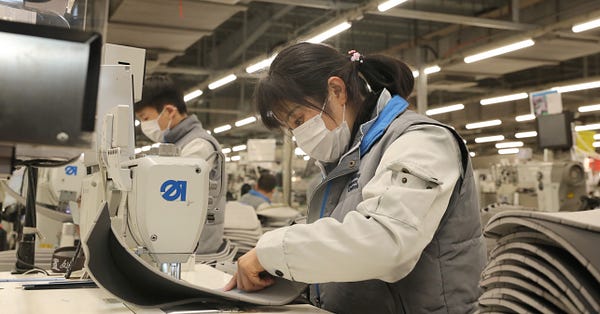Welcome to the 152nd edition of Trade War.
Manufacturing faces worker reckoning in the wake of Covid Zero. Migrants who flooded home to the countryside are not coming back to factory jobs. And labor unrest may spike this year.
Wang Yi and Blinken spar at Munich Conference. And China retaliates against recent U.S. balloon sanctions, slapping penalties on American defense companies supplying Taiwan.
Just published rules on overseas listing heralded as sign Beijing is backing away from tech sector crackdown. But top banker disappears fanning new fears for entrepreneurial class.
<And special to this issue, interviews on Taiwan’s future and the U.S.-China relationship; and why migrant workers are leaving the cities and returning to the countryside>
An expert on Chinese espionage says Taiwan military infiltrated by mainland intelligence agents and makes a persuasive case as to why the U.S. must defend Taiwan in the case of military aggression (spoiler: beyond strategic imperatives, not protecting Taiwan would deal blow to American credibility when it argues it supports democracies worldwide.)
And a Beijing-based labor expert explains why as Chinese migrant workers leave factories and return home to the countryside, they are becoming increasingly disillusioned about their futures and upset with the state.
Post Covid Zero factories struggle for workers
Manufacturers in the export belt of Guangdong and elsewhere in China are struggling to find migrant workers, many of which have returned to the countryside after suffering under repeated Covid lockdowns and factory-imposed, harsh “closed loop” production systems.
“Migrant workers’ reluctance to return to the big factory hubs that account for about a third of the world’s manufacturing output is exacerbating long-term structural problems in China’s labor market. Before Covid Zero, the workforce was already shrinking because of an aging population and young people have become less willing to work in lower-paid, labor-intensive industries,” reports Bloomberg News.
“More migrant workers became more determined to stay in their hometowns after experiencing the uncertainties amid the Covid lockdown,” says Jones Lang LaSalle Greater China chief economist Bruce Pang. “Improving infrastructure and the governments’ supportive policies in the rural areas managed to convince more workers to seek for jobs locally.”
“China definitely, over a very short period of time, will lose every opportunity it had on labor-intensive things,” says European Union Chamber of Commerce in China president Joerg Wuttke. “If China wants to be competitive, they have to look after the migrant workers.”
“Imagine that you are far away from home in a megacity where your salary for your entire life can’t afford a house, you live in a tiny old room with a shared toilet with many others and work 12 hours a day. The only goal is to make and save as much money as possible,” says Tang Ning, a job recruiter in the Guangzhou district of Haizhu. “But then the lockdown came. You don’t know how long you’ll have no pay at all.”
“For young workers who only came in the past three years, Guangzhou only gave them the experiences of living in the tiny rooms, being locked down and failing to make any savings. What’s the point of staying?”

Migrants give up on finding jobs in cities
I dust off my rusty Chinese in an interview with VOA Chinese where I discuss how many migrant workers are giving up on finding jobs in the cities. Here is the longer text version of the interview (Chinese).

Labor conflicts between workers and enterprises
“Based on our observations in 2022, the business closures and market reshuffling within various industries in China will likely become more intense in 2023. Real estate companies, brick-and-mortar retailers, and factories that mainly sell to foreign markets will all face greater pressure,” says an annual report on worker rights in China by Hong Kong-based China Labour Bulletin.
“Whether China's official channels can effectively handle the labour conflicts between workers and enterprises under the increasing layoffs and wage arrears will be telling for the levels of unrest on the ground in the coming years.”
Lying flat and “angry at the state”
I reached out for an interview with a Beijing-based labor expert who is a longtime source and deeply knowledgeable about China’s migrant workers, their work and life aspirations, and their increasingly fractious relationship with factory management and the state.
He sees the global drop in trade as accelerating the move of remaining lower-end production including textiles and electronics manufacturing out of China. There is a growing sense amongst migrants that they are no longer able to change their social status through hard work and education; that is encouraging the “lying flat” phenomenon as well as real anger at the state.
Given the sensitivity of the topic, he asked to not be named. The full interview is below:
Keep reading with a 7-day free trial
Subscribe to Trade War to keep reading this post and get 7 days of free access to the full post archives.



